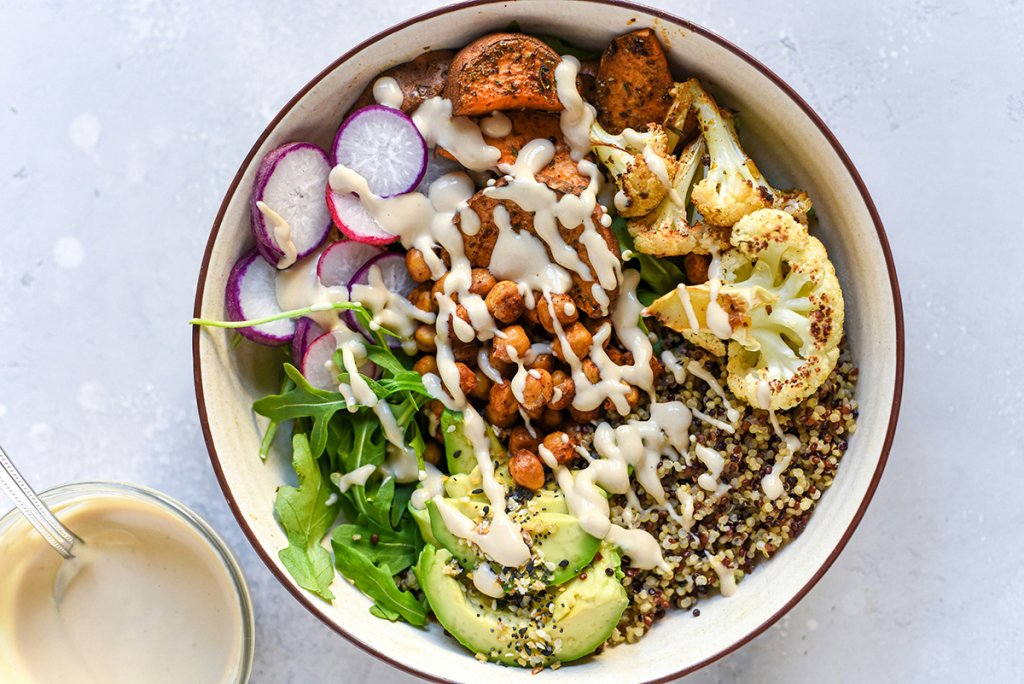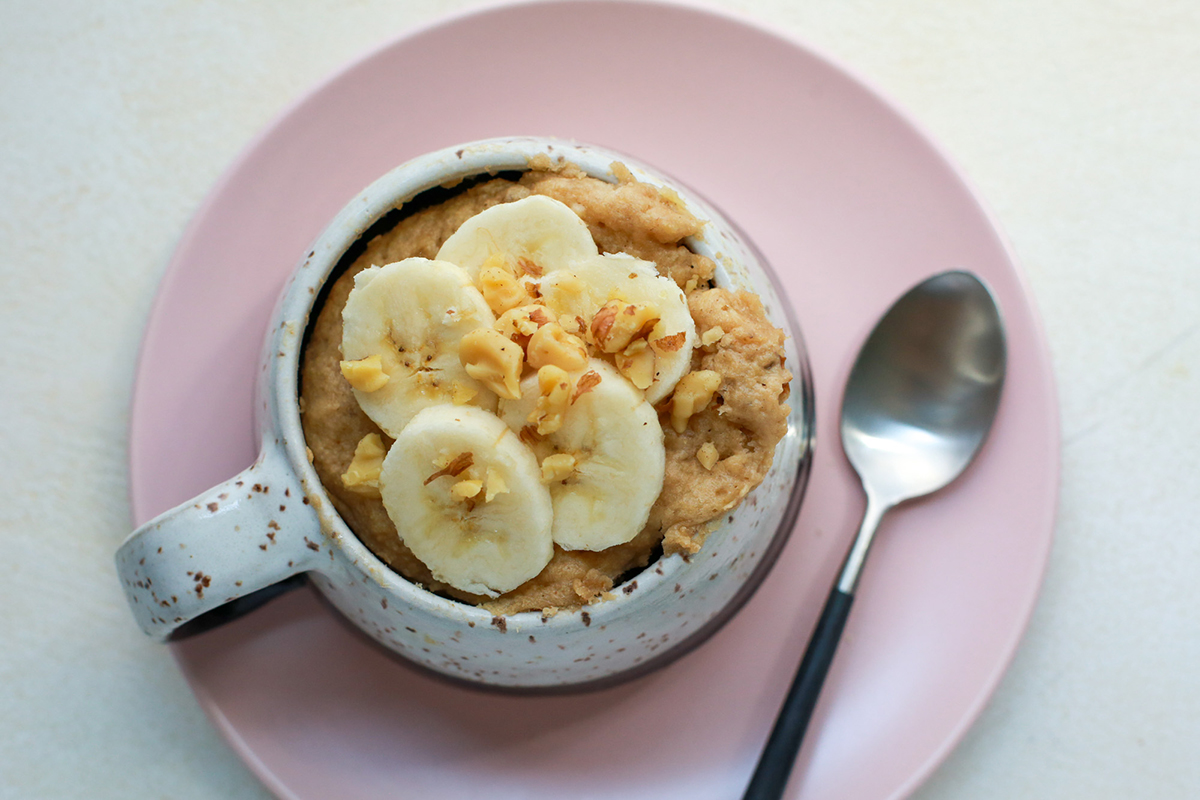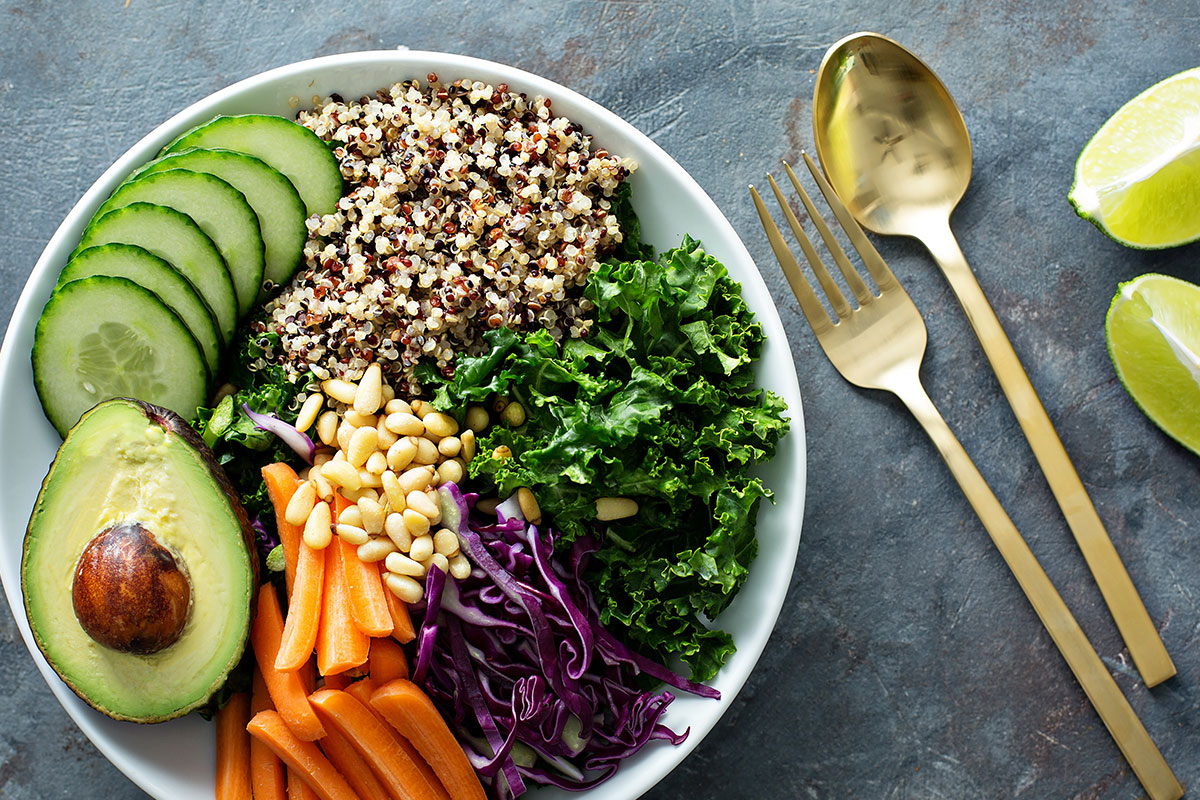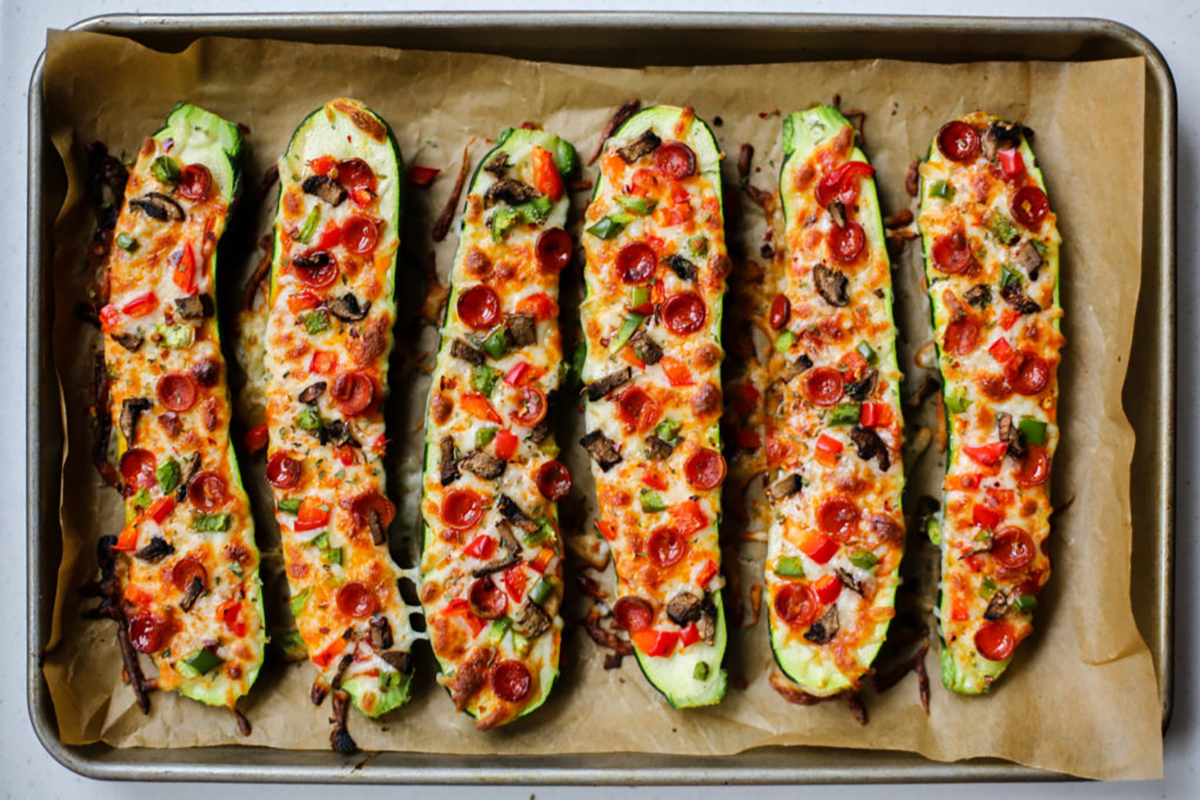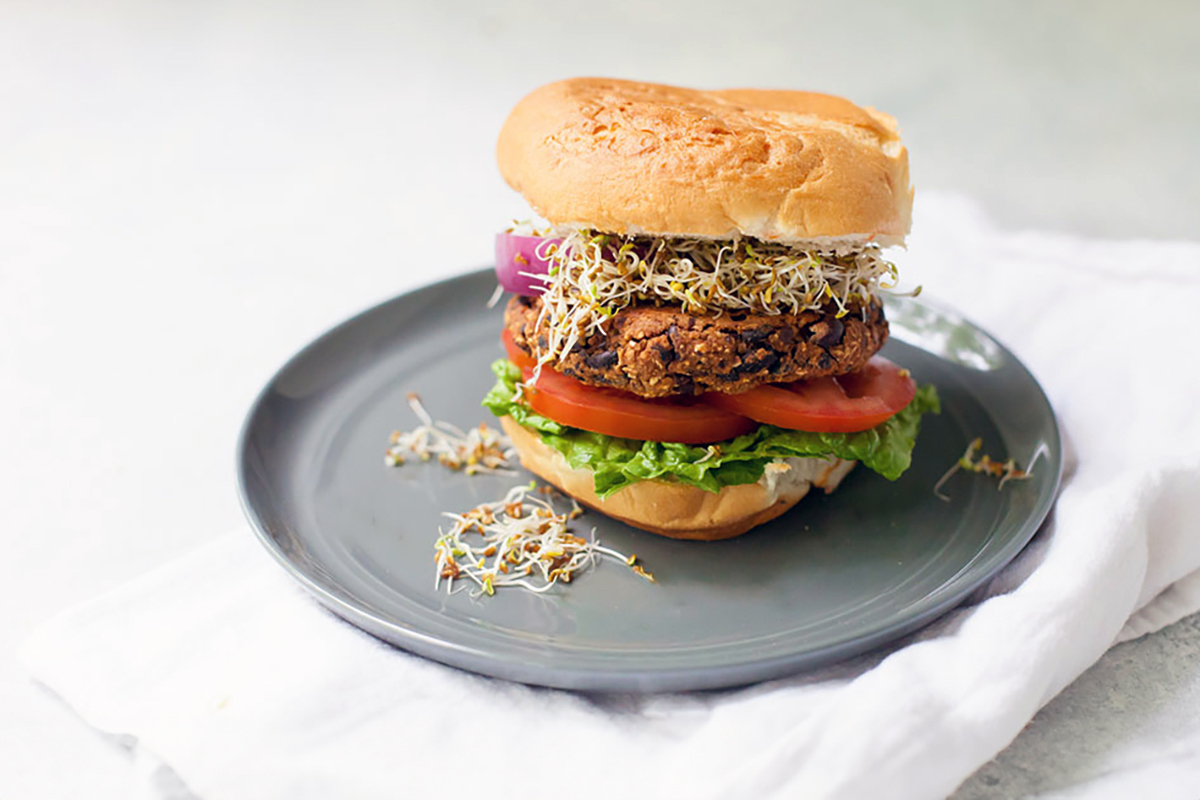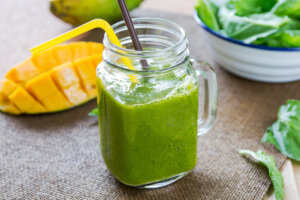When it’s bulking season, you’ve got lots on your mind: your workout splits, planning rest and recovery, and of course, your diet. Building up muscle mass requires extra energy and calories — especially protein and carbs. Sounds difficult for vegetarians, right?
What if we told you that you can achieve muscle bulk without loading up on canned tuna and chicken breast? It’s true — and we’ll let you in on the secret: vegetarian meal prep. Not only does it save time and money, but it can help you achieve your fitness goals faster. We’ll tell you how and cover:
- The ideal macronutrients for bulking
- How to bulk using vegetarian recipes
- High-protein vegetarian meals for breakfast, lunch, and dinner
- Tips for vegetarian meal prep
What is bulking?
Bulking is the process of consuming extra calories for a period of time to support muscle growth.
Some of the most common reasons for bulking include:
- More muscle mass
- Enhanced strength
- Increased bone density
- Enhanced quality of life and aging
- Improved metabolism
For some, bulking is about simply getting stronger and making everyday activities easier; for others, it’s about creating that “buff” look. Whatever your reason for bulking, there are a few key factors that support muscle growth.
1. Exercise
In order to bulk, your calorie surplus needs to be accompanied by a regular strength training routine and clear goals.
2. Rest and recovery
Rest and recovery are essential to any workout routine, especially if your goal is muscle growth. Recovery gives your muscles time to repair and grow — not to mention overtraining can lead to injury and slow down your progress.
Consider incorporating one day of active recovery into your weekly schedule, including low-impact activities like:
- Going for a walk
- Dynamic stretching
- Light cardio
- Restorative yoga
- Swimming
- Kayaking, climbing, or hiking
3. Diet
Bulking requires a calorie surplus, meaning you consume more calories than you expend in a day. Regardless of your fitness goals, a well-rounded diet of healthy meals supports muscle repair and growth, provides energy, and promotes overall wellness. Aim for a diet that’s rich in:
- Whole fruits and vegetables
- Complex carbs
- Lean proteins
- Whole grains
- Fatty acids
- Oils
- Low-fat or fat-free dairy
If you have specific goals like building muscle mass or losing weight (hello, low-calorie vegetarian recipes), tracking your macronutrients can help you achieve them quicker.
What are macros?
Macronutrients, or macros, are three major sources of nutrients that your body needs for energy. Counting macros means monitoring the types and amount of fats, protein, and carbohydrates you’re consuming to fuel your body.
Carbs
Carbohydrates are the body’s main source of energy, and they include sugar, starch, and fiber. Despite what low-carb meal plans and diets may promise, carbs are an essential part of healthy meals.
Protein
Protein is made up of amino acids, which are essential for your body to function properly. Eating a diet that’s rich in protein speeds up muscle recovery, helps build muscle mass, and helps you maintain a healthy weight.
Fats
Fats support cell function, help regulate hormones, and help our bodies absorb nutrients. A diet that’s rich in healthy fats may include:
- Olive oil and coconut oil
- Avocado
- Olives
- Nuts
- Butter/ghee
- Fish oil
How to track macros for bulking
The numbers will vary from person to person, but bulking requires consuming more calories than your body needs over a period of time. In general, you should aim to consume 10%–20% more calories than your daily maintenance needs, or your total daily energy expenditure (TDEE).
You can calculate your TDEE with a simple formula: base metabolic rate (BMR) x activity level = TDEE. To build muscle mass, aim to consume more calories than your TDEE. You may want to set a calorie goal of your current body weight in pounds times 16 to 20. For example: 150 pounds x 18 = 2,700 calories.
Once you’ve calculated your daily caloric needs, you can determine your macronutrient needs, or your macro split — the amount of calories in protein, carbs, and fats you’ll consume.
Let’s start with protein. For bulking on a vegetarian diet, aim for 0.7 to 1 gram of protein per pound of body weight or more, through protein-dense, plant-based options including tempeh, tofu, seitan, beans, lentils, chickpeas, and plant-based protein powders.
Then, calculate your fat percentage. A baseline between 0.25 grams to 0.5 grams of fat per pound of body weight is a great place to start.
Once you’ve set your protein and fat goals, the remaining calories should be filled in with carbohydrates.
Macro math
Protein and carbohydrates provide 4 calories per gram, while fats provide 9 calories per gram.
Use these numbers to calculate the total number of calories of each macronutrient you should consume. Let’s look at an example of a 150-pound person with a muscle gain goal.
Step 1: Set calorie goals: 150 lbs x 18 = 2,700 calories
Step 2: Set protein goals: 150 lbs x 1 = 150g protein
Step 3: Set fat goals: 150 lbs x 0.5 = 75g fat
Step 4: Set your carb goals: 2,700 calories – (600 calories from protein + 675 calories from fat) = 1,425 calories from carbohydrates = ~356g of carbohydrates
To gain muscle, the person’s daily nutrition goals are: 2,700 calories, 150 grams of protein, 75 grams of fat, and 356 grams of carbohydrates.
Remember that macros are just a guideline and it’s okay if you don’t hit your exact nutritional goals every day. For personalized advice, seek the guidance of a registered dietitian or nutritionist.
High-protein vegetarian meals
When you’re bulking, most of your calories should come from carbohydrates and protein. Despite popular belief, protein doesn’t just come from meat — and you can achieve a bulk on a vegetarian diet. There are plenty of vegetarian sources of protein, including:
- Eggs
- Tofu
- Beans and lentils
- Vegetables like sweet potatoes, broccoli, spinach, and asparagus
- Greek yogurt
- Cottage cheese
- Cheese
- Hummus
- Nut butter
- Fish and shrimp (for pescatarians)
Try these high-protein vegetarian meals that can be easily prepped for the whole week to take the guesswork and planning out of your bulk.
Note: These recipes are suggestions to get you started. Remember to keep track of how many grams of carbs, fats, and protein you’re eating throughout the day and adjust your meal plan accordingly.
Vegetarian recipe for breakfast
Protein-Packed Banana Bread in a Mug
This protein-packed banana bread in a mug is one of our favorite recipes for vegetarian meal prep. Mix your dry ingredients in a jar ahead of time and store them in a cool, dry place. In the morning, add a banana and a splash of maple syrup then pop it in the microwave for an easy, nutritious meal that’s ready in minutes.
Vegetarian recipe for lunch
Build-Your-Own Grain Bowl
These build-your-own grain bowls make vegetarian meal prep easy, and we love that they’re customizable. Simply prep your ingredients — a base, a protein, a veggie, a sauce, and toppings — ahead of time and store them in the fridge for up to 5 days.
Reheat and serve your bowls for an easy, nutritious lunch or dinner.
Vegetarian recipe for an afternoon snack
Roasted Pizza Zucchini Boats
These roasted pizza zucchini boats are one of our favorite recipes for vegetarian meal prep — just skip the pepperoni and reduce the amount of cheese to make it macro-friendly. Chop your ingredients ahead of time and store them in the fridge for up to 5 days for an easy, nutritious meal that’s ready in minutes.
Vegetarian recipe for dinner
5-Ingredient BBQ Black Bean Burgers
Loaded with carbs and protein, these 5-ingredient BBQ black bean burgers are one of the most convenient — and delicious — healthy vegetarian dinner ideas. Add it to your weekly vegetarian meal prep plan for a no-fuss dinner option that supports your macro goals.
Do high-protein, low-carb vegetarian meals support bulking?
While high-protein meals will help make up a bit of the calories you need to gain weight, opting for high-protein, low-carb vegetarian meals will make it difficult to achieve a calorie surplus, which could slow down the weight gain progress. (Looking for low-calorie vegetarian recipes? It’s hard to achieve a bulk in a calorie deficit.)
Carbs are a primary fuel source for weight gain and mass building — and your body needs energy to support your hard work in the gym. Balanced, plant-based options like cruciferous vegetables (think cauliflower and broccoli), beans, and whole grains are rich in protein and carbs and make up a well-balanced vegetarian diet.
Should vegetarians take vitamins?
Although vegetarian meals can fulfill daily nutrient requirements, people eating a plant-based diet may need to monitor levels of specific vitamins and nutrients. Vitamins can enhance a healthy lifestyle and support metabolic processes, but they can’t replace proper nutrition and exercise.
Vitamins and supplements are often designed to fill in nutritional gaps — like dietary restrictions, insufficient intake of nutrients, and intense physical activity or medical conditions — but it’s best to consult with a healthcare professional before taking any vitamins to supplement a diet that consists of vegetarian meals.
The benefits of vegetarian meal prep
Meal prepping makes eating healthier and meeting your nutritional goals easier, especially when you’re bulking and have specific dietary needs. Here are some of the reasons we love vegetarian meal prep:
- Meal prep helps you control your portion sizes and better gauge your intake of protein, carbs, and fats.
- Meal prep saves time and you won’t have to do the dishes every night after dinner.
- Meal prep helps you save money; you’ll spend less at the grocery store when you have a specific plan, and you’ll be less likely to order in.
- Meal prep helps you make healthier choices. When you’ve already got healthy vegetarian meals ready to eat in the fridge, you’ll be less likely to choose less wholesome options for breakfast, lunch, or dinner.
Tips for vegetarian meal prepping
Use these tips to make vegetarian meal prep a breeze.
1. Create a meal plan and a grocery list.
Creating a meal plan — whether it’s weekly or monthly — helps you choose healthy recipes ahead of time and makes it easier to make your grocery list (and keep track of your macros). When you head to the store, stick to your list. You’ll save time and money, and you’ll be less likely to reach for items that aren’t in your meal plan.
Pro tip: Buy ingredients that can be used in multiple recipes to save money.
2. Plan when you’ll shop and when you’ll cook.
Consider when you’ll have the energy and space in your schedule to shop and cook your vegetarian meals. By setting aside time to meal prep, you’ll be more likely to finish the task.
3. Consider eating the same meal more than once.
Opt for healthy recipes that freeze easily or refrigerate well. Eating the same meal for lunch during the week or repeating dinners saves on prep time, cooking, and dishes — and it means less planning for you.
Pro tip: If preparing healthy recipes in bulk isn’t realistic for you, trying prepping ingredients, not meals. Keep items like chopped veggies and fruit in your fridge for easy and fast cooking.
A final note on vegetarian meal prep
No matter your fitness or nutritional goals, vegetarian meal prep can help you make healthier choices that support your body and lead to better overall wellness. Remember that you may not achieve a perfect macro split every day, and that’s okay. You’ll still benefit from monitoring your macro intake and knowing how what you’re eating impacts your body. Give yourself time and patience as you find healthy recipes you like, learn the ideal macro split for your fitness goals, and adjust to a vegetarian meal prep schedule.
More healthy vegetarian dinner ideas
Try one of these healthy recipes that can be easily modified with plant-based options for more healthy vegetarian dinner ideas to meet your nutritional goals. Don’t forget to save some for lunch!
- Easy almond-crusted tilapia with lemon
- Jalapeno popper bean soup
- Roasted veggie wraps with red bell pepper hummus
- Super easy oven-roasted vegetables
- Freezer-friendly veggie pasta bake
Hungry for more? Head to the Anytime Fitness blog for additional nutrition resources, including healthy recipes and meal inspo.
